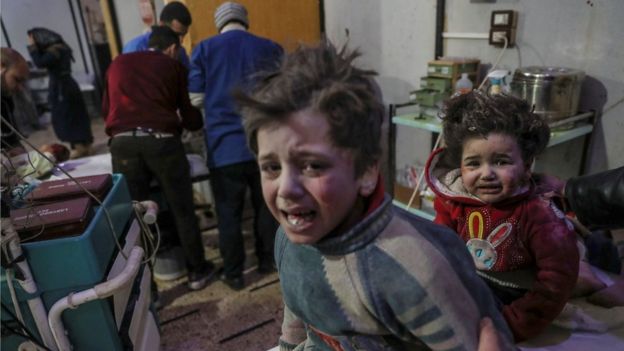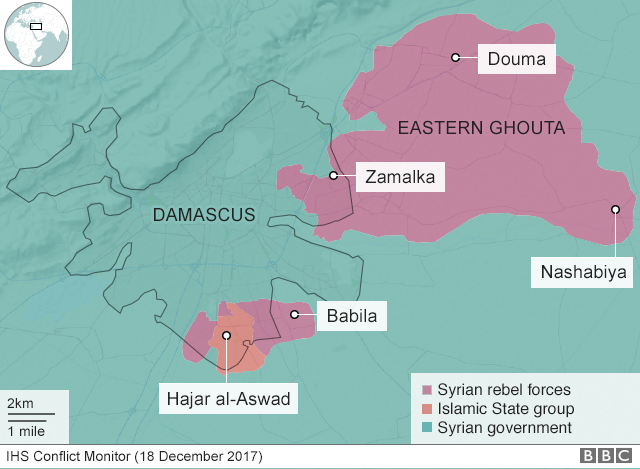
Urging a halt to the bombardment, a UN official said the situation was spiralling out of control.
Almost 400,000 people live in the Eastern Ghouta, which has been under siege since 2013.
It is the last remaining opposition-held enclave near the capital Damascus.
Syrian forces stepped up their campaign to retake the area earlier this month, reportedly killing hundreds of people and injuring many more.
It led to a rare ceasefire to deliver supplies to civilians living in the conflict zone.
Meanwhile, Turkey warned the Syrian government not to help Kurds fighting against Turkish forces in northern Syria.
Why is there a war in Syria?
Syrian timeline
Worst bombing in years
Analysis by Lina Sinjab, BBC Middle East correspondent
The attacks on the Eastern Ghouta area since Sunday have hit not only civilians but also their means of survival, targeting bakeries, warehouses and anything else that may hold food supplies.
It is the worst single day of bombing that people there have seen in years. People are fearful of it becoming another Aleppo scenario.
Aid workers say the attacks targeted major roads in the area, which will block any aid or rescue operation and hinder the movement of ambulances.
The death toll is rising because medical facilities were also hit. Four makeshift hospitals - including a maternity facility, were struck on Monday. The rebels have been responding with mortar attacks on Damascus but the government's military might is far stronger.
How bad is the situation in Eastern Ghouta?
Monday's death toll, reported by the Syrian Observatory - a UK-based opposition network monitoring the violence - has not been independently verified.
Videos from Hamouria, a town in the enclave where at least 20 people were reportedly killed in air strikes on Monday, showed people fleeing heavily damaged buildings covered in dust and debris.
In December international aid organisations warned conditions in the rebel-held area had reached a "critical point" for civilians because of shortages of food, fuel and medicines.

UN regional humanitarian co-ordinator Panos Moumtzis said it was "imperative" to end the "senseless human suffering" in Eastern Ghouta.
"Many residents have little choice but to take shelter in basements and underground bunkers with their children," he noted.
However, Russian Foreign Minister Sergei Lavrov said conditions in the enclave were being exaggerated by international actors.
"In the UN, the topic of humanitarian problems in Eastern Ghouta and Idlib is being actively hyped up," he said, according to Russian media reports.
Next month marks seven years of civil conflict in Syria.
Hundreds of thousands of people have been killed and an estimated five million have fled the country.


No comments:
Post a Comment